PGY1s
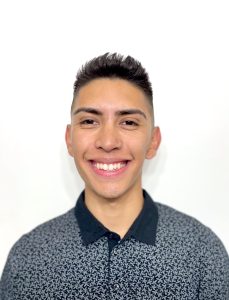 Carlos Escutia Rosas, MD
Carlos Escutia Rosas, MD
Hometown: Lynnwood, WA
Undergraduate College: University of Washington
Medical School: Rush Medical College
Why did you choose UW Psychiatry?
I grew up in the Seattle area, and returning to UW allows me to serve the communities that shaped me. I was especially drawn to the program’s strengths in child and adolescent psychiatry, LGBTQ+ mental health, and its focus on underserved populations across Washington. I also missed being surrounded by nature and always knew I’d eventually come back for that reason.
Career Goals
I plan to pursue child and adolescent psychiatry with a focus on LGBTQ+ youth, immigrant families, and undocumented communities. As someone with lived experience navigating the mental health impact of legal vulnerability, I think a lot about how changes in immigration policy affect people’s sense of safety, belonging, and stability. I hope to develop models of care that are trauma-informed, culturally responsive, and grounded in advocacy. Long-term, I want to contribute to efforts that expand access to mental health care regardless of immigration status.
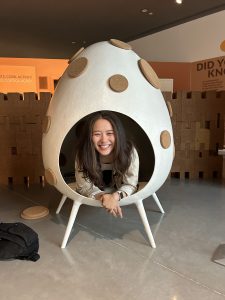 Gina Leipertz, MD, MGH
Gina Leipertz, MD, MGH
Hometown: Seattle, WA
Undergraduate College: New York University Shanghai
Medical School: Washington State University, Elson S. Floyd College of Medicine
Why did you choose UW Psychiatry?
I wanted to return home to Seattle not only to be close to family and friends, but also to begin my psychiatry training among the communities I grew up with, which is very important to me. Beyond being home, the University of Washington offers a strong academic program with diverse training opportunities, mentorship, and education on how to become an excellent academic psychiatrist. Being back in Seattle also gives me the chance to continue working on my garden (cucumbers are my specialty) and to spend more time reconnecting with nature.
Career Goals
While I am still sorting out the specifics of what I want to do long term, I know I want to continue working with diverse communities with a focus on cultural and community psychiatry in Washington State. I would like to stay involved in research, particularly around public health, health equity, and implementation. Additionally, I could see my self staying with the University of Washington as a clinical educator or research faculty – but we will see!
Clinical Rotations
- 4 months Harborview inpatient psychiatry
- 1 month VA inpatient psychiatry
- 2 weeks Harborview inpatient psychiatry night float
- 1 month Harborview medicine
- 1 month Harborview medicine consults
- 1 month VA medicine
- 1 month Harborview emergency medicine
- 1 month UW Montlake neurology
- 1 month VA neurology
How many hours on average do you work each week?
40-70 hours depending on the week or call shifts.
How often do you work nights and weekends?
1-2 weekend days per month, but this varies by rotation.
Sunday
Daytime: Spent time with my parents, sister and family dogs. During the summer, I have been puttering around my garden and going on gathering excursions with my family (morel gathering, fishing and huckleberry picking!) However, this Sunday I treated my sister and myself to manicures – currently I have cute little tomatoes on my nails 😊
Evening: Have a family dinner with my parents then take plenty of leftovers for the week. I got to my apartment and washed all my scrubs. Sometimes, I’ll look at the patient list for the week and start thinking about my plan for Monday.
Monday
Daytime: I am currently on inpatient psychiatry at Harborview, so I usually start the day at home reviewing charts, starting progress notes and enjoying my morning coffee. I aim to arrive at the resident work room by 7:30am to get sign out from our night float intern. Our team – medical students and attending – meet at 8 am and update one another on any relevant sign out then head to the unit to begin rounds. Medical students and I split interviews with patients then we meet with the interdisciplinary team (social work, occupational therapy, nursing and pharmacy) at 9:30 am to review patients and update plans. We then continue rounding and by 11 am start to run the list and divide up tasks for the day. The team splits up to work on tasks and at 12 pm we all meet with the other residents and medical students for an educational session (this week was EKG reading) and free lunch! The afternoon is spent completing tasks, which often include reaching out to consulting teams, collateral and updating loved ones. I am also completing notes and reviewing medical student notes. I was on short call this Monday, which means I stay until 8 pm when the night float intern arrives and am responsible for all psychiatry patients. I start receiving sign out for short call as early as 3 pm from attendings and finish receiving sign out from co-residents by 5pm. I answer a few calls and Epic chats during my short call, finish my notes for the day (I cannot wait until I perfect efficiency) and sign out to the night float intern at 7:45pm then head home around 8pm.
Evening: Lucky me, my partner picks me up from Harborview. We make dinner and unwind with some TV before heading to bed by 10 pm.
Tuesday
Daytime: Start chart review at home with coffee, which is generally faster on Tuesday because there is less to catch up on from over the weekend. I get sign out from the night float by 7:30 am then meet with the team at 8 am to start rounding. We did not have education this day, so instead I took the medical students for a coffee run and tour of Harborview visiting the Psychiatric Emergency Services in the ED, the cafeteria, and the Harborview park that overlooks the Seattle harbor (so beautiful!) Like most afternoons, I spent it calling outpatient providers, following up on consult recommendations and finishing notes. I leave by 5:30 pm after signing out to the short call resident.
Evening: Instead, I pick up my partner and we go to our new apartment to continue the endless process of cleaning. After the traffic dies down, a little, we head to north Seattle and have late dinner with his family.
Wednesday
Daytime: Similar day to prior. For lunch, I visited the cafeteria for the famed Meal Deal – ~$5.25 (with tax) you get a solid lunch (rotating menu) and a drink. Visit the Instagram page hmc_meal_deal for an idea of what delicacies the Harborview cafeteria has to offer!
Evening: Met up with some friends for dinner in north Seattle. I visited my parents and checked on my cucumbers and corn – almost ready to harvest!
Thursday
Daytime: Similar prep to past few days but with some more pressure to be efficient because I needed to leave Harborview by 11 am to get to Northwest Hospital by 12pm for R1 meeting with our lovely APD Dr. James Lee and PD Dr. Jacqueline Hobbs. After rounding on my patients, the medical students and attending continued rounding while I put in orders and wrapped up notes on a few patients. On half days, the attending helps spilt tasks so I can leave with time to traverse traffic to get to Northwest Hospital. After meeting with our APD and PD to discuss as a group what is going well and what is not going as well (…Seattle traffic) we meet with our T group facilitator to decompress. After group we have didactics until 5 pm.
Evening: Unpopular opinion, I like going to Northwest on Thursdays but this is because the commute to my parent’s house is quick. I visit my parents, eat an amazing salmon dinner (my dad caught the king salmon the same day!) and, again, tend to my garden.
Friday
Daytime: Same as prior days with a case presentation at 1pm. Attending provides feedback to medical students and I. I leave around 6pm after finishing my notes and weekend plans for the weekend team.
Evening: Went out for dinner with my partner then played video games (check out Brotato) and went to Molly Moon’s to try the seasonal ice cream flavors (I am a fan of the peaches and cream).
Saturday
Daytime: Spent the morning exploring our new neighborhood and eventually got coffee at Boon Boona Coffee. My partner and I met up with some friends to go to the Seattle Aquarium where we saw our ultimate frisbee teammate diving.
Evening: We went for dinner in Chinatown at Boiling Point and wrapped up the evening with some daydreaming about our next vacation (snowboarding in Hokkaido, Japan this winter, hopefully!)
PGY2s
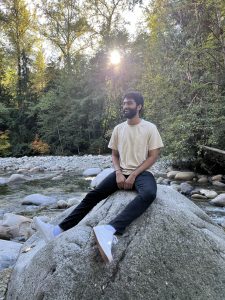
Mahtab Brar, MD
Hometown: Seattle, WA
Undergraduate College: Oregon State University
Medical School: Oregon Health and Sciences University
Why did you choose UW Psychiatry?
I always wanted to come back home to Washington after completing my medical training, so doing my training in Washington was only natural. While geography certainly played a role in my decision, it was my interactions with the people in the program that pushed UW over the top for me. The warm, welcoming, and diverse cast of residents and faculty made UW a very appealing environment for me. Additionally, you can’t go wrong with the endless amounts of food, hiking, soccer, and activities available in Seattle.
Career Goals
The only certain part of my career goals for now are the desire to practice in a more rural locale. Otherwise my career interests are constantly in flux and at this point all I know is that I made the right choice in pursuing psychiatry.
Clinical Rotations
- 3 months Harborview inpatient
- 1 month Seattle Children’s inpatient
- 2 weeks UW Northwest long-term civil commitment inpatient
- 2 months Harborview consult/liaison
- 1 month UW Montlake consult/liaison
- 1 month VA consult/liaison
- 1 month Harborview psychiatric emergency services
- 2 months VA addiction treatment center
- 2 weeks VA night float
- 2 weeks day float
- 2 weeks risk
How many hours on average do you work each week?
40-60 hours depending on the week or call shifts.
How often do you work nights and weekends?
About one weekend day or night per month.
Sunday
Daytime: Play soccer. Met up with a friend at a cafe to study for Step 3 together.
Evening: Buy groceries and try to meal prep for the week before eventually giving up and lounging on my couch. Briefly engaged in shopping therapy #selfcare
Monday
Daytime: I am currently on HMC Consults! Arrive to consult workroom around 7:45am to get sign out from the overnight resident, chart review for about 45 mins. We then engage in table rounding on the whole list and discuss disposition needs with our wonderful team social worker. After this, I go to see my patients which takes most of the morning. On consults this can be independently, with the fellow, attendings, or medical students. After I see my patients and grab Harborview’s famous meal deal, I sit down to grind out some notes. After finishing notes, I await new consults and work on other administrative tasks in the interim. We discussed important topics like Pizza Hut’s $2 personal pan pizza deal this July/August. I sign out to short call at approximately 5pm and head home.
Evening: Brief nap before heading to the gym for leg day. After leg day I boot up my laptop and force myself to study for Step 3.
Tuesday
Daytime: Arrive to the hospital to get caffeinated around 7:30AM and then get sign out at approximately 7:45. I spend the morning updating families after table rounding and quickly see my patients this morning before we have psychotherapy didactics. At approximately 11, I leave to go to Northwest Hospital where we spend the rest of the afternoon practicing mock psychotherapy sessions with each other. I then give a live karaoke performance in traffic for approximately 30ish mins on the way back home.
Evening: Went to the gym again where I did an upper body workout followed by some jump rope. Pretend to study for Step 3 for about 15 minutes before I decide to go play video games with friends
Wednesday
Daytime: Similar day to prior.
Evening: Rot on my couch for approximately an hour before receiving call from outpatient psychiatrist and documented collateral. Followed this up by playing soccer with my friends from psychiatry/internal medicine. Played video games afterwards to wind down.
Thursday
Daytime: Stayed up far too late playing video games and slammed 1 Celsius prior to work. Thursdays we have didactics so after a half day of seeing patients I head back to Northwest Hospital to spend the rest of the day learning. We spend our first hour in T group, where we commiserate over our shared experiences as physicians in training. Afterwards we have two interesting lectures on child psychiatry with time for a yummy snack break.
Evening: Studied for Step 3. Ended the day by reading a book I recently bought, Vengeful by V.E. Schwab.
Friday
Daytime: Continue working on the consult service. Briefly discussed state of child psychiatry in Washington and difficulties with finding inpatient beds across the nation. Conversation stemmed by watching an informative TikTok with Dr. Huijon. Sign out at 5 after seeing some new consults and enjoy the weekend!
Evening: See my baby (8.5 months!!) niece, sister, brother in law, and grandparents. Push/pull work out and get a gym membership (I usually work out at my apartment gym). Attempt to study for Step 3 but fail.
Saturday
Daytime: 7am soccer with friends and then a subsequent nap to recover. Spend most of the day studying for step 3.
Evening: Go for a walk in the evening with a friend from medical school at Seward Park.
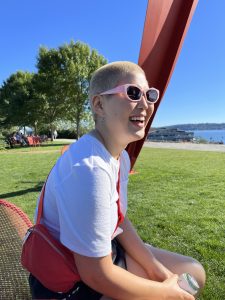
Sarah Batbold, MD
Hometown: Queens, New York
Undergraduate College: New York University Abu Dhabi
Medical School: Mayo Clinic Alix School of Medicine
Why did you choose UW Psychiatry?
The authentic, values-driven conversations I was able to have during my UW interview day gave me confidence that I would be able to build a really wonderful community at this residency. Seattle is such a dynamic, open-minded, and somehow still down-to-earth place, and the program at UW reflects that in many ways – from the diverse intersections of identity represented in our resident cohorts to the innovative research and QI work our department is known for nationally.
Career Goals
At this point, I’m pretty sure I’d like to be an adult psychiatrist, and find myself consistently drawn to topics of addiction, intercultural psychiatry, incarceration, and LGBTQIA+ identity. Forensic or Addiction fellowship may be in my future!
Clinical Rotations
- 3 months Harborview inpatient
- 1 month Seattle Children’s inpatient
- 2 weeks UW Northwest long-term civil commitment inpatient
- 2 months Harborview consult/liaison
- 1 month UW Montlake consult/liaison
- 1 month VA consult/liaison
- 1 month Harborview psychiatric emergency services
- 2 months VA addiction treatment center
- 2 weeks VA night float
- 2 weeks day float
- 2 weeks risk
How many hours on average do you work each week?
40-50 hours depending on the week.
How often do you work nights and weekends?
About one weekend day or night per month.
Sunday
Daytime: Grocery shopping and some light meal prepping for the week.
Evening: This week I switch from a month of consults at Montlake to the inpatient service at Harborview, so I take some time to read up on my new patient list, reviewing admission notes and recent progress/treatment goals.
Monday
Daytime: Arrive to the Harborview resident workroom around 7am, get sign-out on my patients from the overnight resident, and chart review for about an hour. At 8am, I join my attending (+/- a medical student or two) and head to multidisciplinary team meeting with members of our unit’s incredible nursing, social work, occupational therapy, and pharmacy staff. After meeting, we interview patients and usually finish up rounding by 11am. From 11-12, I plug in medication orders, call consults, grab an ice coffee from the Maleng cafe, and get started on some progress notes. On Mondays from noon-1pm we have didactics led by the inpatient chief resident. Afterward, I finish up on notes, go back to see specific patients I’d like to gather more information on / practice some therapeutic listening with, and generally interrupt my coresidents’ workflow with random chatter. I usually finish up my to-do’s and sign out to the short call resident sometime between 3 and 6pm depending on the day, and then head out for the evening.
Evening: Tacos Chukis to-go and watching all the dogs in Cal Anderson with my sister.
Tuesday
Daytime: Similar to Monday but starting in September I’ll have split Tuesdays with inpatient mornings followed by an afternoon of my very own clinic patients at UW Montlake outpatient psychiatry. Really excited to have some outpatient exposure peppered in because the first two years are almost entirely hospital based.
Evening: Stay in and admire my two 4-month old kittens alternatingly play-fight and nap.
Wednesday
Daytime: Full inpatient day.
Evening: Facetime catch-up with a med school friend and read whatever I’ve recently picked up from Elliott Bay Book Company.
Thursday
Daytime: Half-day of inpatient followed by afternoon R2 didactics covering topics like complex decisional capacity assessments, supportive psychotherapy, and advanced psychosis management. In between, from 1-2pm, we have an hour of T-group or “training” group where our whole class gets together to talk through and process difficult cases, unit dynamics, and general trials and tribulations of training. It’s a lovely time to hang out and support each other once a week.
Evening: Go for a run up to Capitol Hill through the pretty Seattle University campus and back.
Friday
Daytime: I’ll be on short call at Harborview inpatient this week, so I receive signout on all the psychiatry inpatient teams and consult patients in the late afternoon and then cross-cover until 7:45pm (when the R1 night float resident takes over).
Evening: Meet up with a friend post-call and go dancing. I love living in Seattle where there are all kinds of events and subcultures to take part in, and I also love being a psychiatry resident and often having full weekends to recover!
Saturday
Daytime: Sleep in late and then a quick dip in Lake Washington alongside an awesome group of locals who gather Saturday mornings – all year round – to jump in the water and share some chai.
Evening: Maybe go thrift shopping or for a walk in one of Seattle’s gorgeous city parks (my favorites are the UW Arboretum and Seward Park).
PGY3s
Jason Finkbonner, MD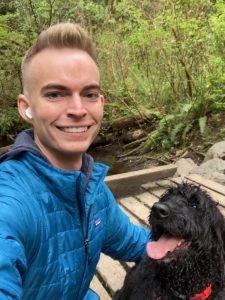
Hometown: Lummi Reservation, Bellingham, WA
Undergraduate College: Western Washington University
Medical School: University of Washington
Why did you choose UW Psychiatry?
UW has the best opportunities for working with and training in indigenous communities that were just unparalleled by other programs. The experiences UW offers across the psychiatry spectrum give us the freedom to find our niche in a very supportive learning environment. Seattle is a great city in a beautiful region with so much nature to explore. Our cohort is full of fantastic people that have been fun and supportive as we’ve gone through training and the large size makes our call schedules very manageable.
Career Goals
I’m really liking trying out all the areas of psych that we cover in training. My long-term goal has always been to work with Native American communities after finishing residency. I’d also like to incorporate some components of inpatient, interventional, and private practice into my future work. What I’ve learned from my attendings is that many psychiatrists change and evolve their practice over the course of their long careers.
Clinical Rotations
- Monday: Child Autism Clinic
- Tuesday: VA Addiction Treatment Center
- Wednesday: UW Outpatient Clinic (OPC)
- Thursday: Didactics, Supervision–no clinical duties
- Friday: Harborview’s Madison HIV Clinic and UW Outpatient Clinic
How many hours on average do you work each week?
Maybe one 12-hour call shift per month.
How often do you work nights and weekends?
Definitely varies by rotation but on average, 40-50 hours/week.
Sunday
Day: Usually sleeping in, doing some laundry and yard work, might hang with some friends or see/call family.
Evening: Drive back to Seattle and get things ready for work on Monday.
Monday
Day: Wake up 0600 and chart review on patients I’ll see that day. 0800 drive to Seattle Children’s Outpatient Autism Clinic and see 1-2 new intakes (1.5-2h visits). 1200 drive home and see my afternoon follow ups remotely. 1600-1700 virtual supervision with my attending and another resident.
Evening: Gym, dinner, walk our dog with my partner; try to be in bed around 2200
Tuesday
Day: Wake up 0600 and chart review on patients I’ll see that day. 0800 drive to Seattle VA Addiction Treatment Clinic and see a mix of new intakes, follow ups, and walk-ins until supervision at 1600 where I staff those patients.
Evening: Looks like Monday, maybe a friend comes over for dinner or we go on a Costco run.
Wednesday
Day: Wake up a little later and take the light rail to UW Outpatient Clinic where I see a mix of new intakes and follow ups for med management, sometimes the afternoons are remote.
Evening: If it’s nice I might go paddle boarding with my partner or we might spend the evening reading after dinner. Otherwise, I try to make it to the gym or do something active. Probably end the night with watching some TV.
Thursday
Day: Didactics at UW NWH start at 0800 and, depending on what seminars and off ward supervision we have, go until around 1230 or 1530. The rest of the day is catching up on charting, pre charting, and trying to beat rush hour traffic back to downtown.
Evening: There’s usually always a group going to happy hour after didactics so I may or may not do that depending on what else I have going on. Get home by 1900, dinner, and maybe a walk.
Friday
Day: 0800-1200 I see a mix of new intakes, follow ups, and walking for med management at the HMC Madison (HIV) Clinic. The afternoon is back to UW OPC (sometimes remotely) for a mix of my therapy and med management patients.
Evening: My partner and I spend a lot of our weekends out of town, often to Bellingham, so we usually drive to where we’re going Friday evenings. Maybe get some food or drinks if we’re up for it.
Saturday
Day: Sometimes a call shift, but not very often. Usually, I try to get to a class at the gym at 0830, then coffee, and probably some chores around the house. In the summer we would probably be paddle boarding at the lake or on our friends’ boat.
Evening: Usually see some friends or just chill at home.
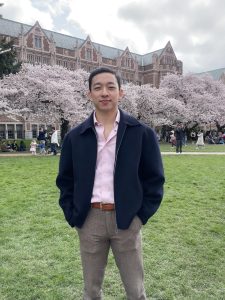 Rob Chen, MD, PhD
Rob Chen, MD, PhD
Research-Track
Hometown: Cupertino, CA
Undergraduate College: University of California, Berkley
Medical School: Washington University in Saint Louis
Why did you choose UW Psychiatry?
In truth, I was very close to not doing residency at all. During my MD-PhD, a post-doc and I started a biotech company developing a microbiome-based platform for drug discovery and environmental remediation. My plan after finishing my MD-PhD was to run the company. Unfortunately (or fortunately) for me, my second-to-last clinical rotation was Psychiatry and I fell in love with it. It was the only medical field where I truly bore witness to the entire span of human emotion, cognition, and psychosocial experience. It was very humbling, and I wanted to take care of folks from all walks of life. UW was a natural choice because I was interested in translational research and drug discovery in Psychiatry. Its proximity to the Allen Brain Institute, Microsoft, and Amazon meant that UW would have collaborative opportunities to integrate AI into enriching therapeutic discovery. Plus, my wife matched to the Fred Hutchinson Cancer Center, so it was THE win-win situation!
Career Goals
I plan to start an academic research lab focused on biomarker and drug discovery for serious mental illness, such as schizophrenia and bipolar disorder. My hope is to quickly shuttle lab findings into early-stage biotech companies in order to get new treatments to patients who currently have few good options.
Clinical Rotations
Because of my focus on research, I purposely designed my R3 and R4 years to maximize research time. As such, during my R3 year, I’ll be doing 3.5 days of research a week (one day of continuity clinic, half-day of didactics), and during my R4 year, I’ll be doing 4 days of research a week (half-day of continuity clinic, half-day of didactics). One of the great parts about UW’s curriculum is its ability to be incredibly flexible – most co-residents won’t be doing any research at all! I extended my R2 year for two months, so I’m currently on one month of child consults followed by one month at the PBMU (child inpatient).
How many hours on average do you work each week?
- R1 year: Depending on the rotation, it could vary widely. On risk, if you weren’t called in, it was close to 20 hours a week. On inpatient medicine, it was closer to 80 hours a week. Plus, after-hours, I was building up a research program, which I spent probably 20 hours a week on, regardless of the rotation I was on.
- R2 year: Usually, a steady 50-60 hours a week regardless of the rotation, plus the 20 hours a week of research I was doing after-hours.
- R3 year (current): It’s been really pretty great! While on child consults, I work a steady 40 hours a week with occasional weekend call. Again, I typically will work after-hours on research.
How often do you work nights and weekends?
I work most weeknights and weekends on research, but that’s by choice. Unfortunately for me, I really love research and want to spend my career primarily doing research. So, in a lot of ways, it’s kind of like “play”? It’s a break from clinical duties, and I get to think actively about topics I’m interested in. I’m a glutton for punishment, I know. R3 call burden is fairly low, so I will probably end up working < 10 night shifts my R3 year (one of the amazing perks of having a large program). It will be my first year doing training calls as a trainer, and I’m looking forward to the opportunity to “pay it forward” – I had amazing trainers my R1 year!
Sunday
Recovery day! Sundays are typically pretty low-key. We spend a lot of time with the dogs (which they love), and will usually be kind to ourselves as we recover from the work and play from earlier in the week. That might mean reading a couple of papers or a book, watching more than one episode of a show together, and calling both of our families over FaceTime to catch up. Since Monday is clinic day, my wife and I will typically pre-chart on our patients. If we have energy, we’ll typically get some research done as well. Rinse and repeat!
Monday
Every morning starts off with Taro, my loveable 80 pound German Shepherd, waking up and thumping his tail against the wall begging for pets. Sadly, that means I usually get up around 5 AM. Taro’s older sister Azuki—she’s a pomsky who essentially looks like a small-to-medium-sized husky—gets up begrudgingly as well, mainly to get fed before going right back to sleep. Taro, however, is more energetic, and demands ball time, so I usually walk over to Green Lake park and throw the ball around with him before heading into work. This is my continuity clinic day. I’m at the UW outpatient clinic from 8 AM – 5PM. After AM patients, I get to reward myself with a walk down University Avenue to pick up lunch from wherever I want – it’s a treat yourself kind of day. After lunch, I have supervision, then PM patients including a new-patient intake. After work, it’s dog daddy time, so my wife and I walk both of our dogs before enjoying dinner, catching up on our days, and doing some research at night before going to bed.
Tuesday
I have a full day at Seattle Children’s Hospital (SCH) on the Psychiatry Consult Liaison service. After my usual doggo routine, I head into SCH and grab an iced matcha americano before interdisciplinary team rounds. SCH is incredibly collaborative – our rounds include mental health specialists, psychologists, case managers, behavioral response team members, and our psychiatry attending, fellow, and resident. We break off to see folks, finish up tasks (orders, touching base with teams, circling back to see people we missed), write notes, and clean up handoffs before heading home. Of course, the doggos need a bit of loving, so my wife and I will cuddle with and walk them, have dinner, and turn on an anime (just finished Frieren, starting Apothecary Diaries) before heading to the gym. My wife and I both lift weights, and going to the same gym keeps us motivated, even when we’re feeling tired. If we still have energy, we’ll close the night off with some research. We’re both wiped, so for some extra support, we give the doggos an extra cuddle before heading to bed.
Wednesday
Pretty similar to Tuesday. Night time activities mid-week though are usually spent recharging. We’re less likely to do research, more likely to do take-out and grab a drink somewhere. Since we live in Green Lake, we really like Toast Mi (best Banh Mi’s in Seattle – and inexpensive!) and Project 9 Brewing – both have a very casual vibe, and Project 9 allows dogs and board games! Of course, gotta give the doggos a snuggle, and heck, we might even let them hop on the bed to recharge.
Thursday
In the morning, I have didactics at the Center for Behavioral Health and Learning at UW Northwest. Depending on how badly I need tea/coffee, I’ll either drive (if I need caffeine) or bike (if I had a good nights sleep). Honestly, didactics can sometimes be tough for me, and I frequently need to caffeinate between lectures. But I also really like didactics days because our whole class gets together, and I absolutely cherish our T-group. If you haven’t heard of T-group, it’s essentially a semi-supervised hour where our class gets to talk about anything. It’s a holding space, where we collectively celebrate vulnerability, honesty, frustrations, pain, wins, and mundanity with one another. It’s residency group therapy. Afterward, I head back to SCH to finish off the day before heading to happy hour with the class, usually in Capital Hill (although we’ve been all over: Ravenna, Green Lake, Greenwood, SLU, U District, etc.).
Friday
We made it! Similar schedule to Wednesday, where I’m in SCH all-day. One difference is that I have off-ward supervision, where I meet with a Psychiatrist not currently employed by UW to talk about challenging patients or encounters with peers/staff, expand my repertoire of psychotherapy techniques, explore transference or countertransference issues that have come up in clinical scenarios, or just shoot the breeze. At night, my wife and I will usually go out for date-night so we can get some time to ourselves. We love cocktail bars, and some of our favorites include Phocific Standard Time, the Lonely Siren, and the Doctor’s Office (yes, you read that right).
Saturday
Time to run errands. After a long walk with the doggos in the morning, my wife and I will usually head over to Costco in Shoreline to pick up meal-prep essentials for the week. We’ll also stop by Asian Family Market to pick up more Asian ingredients and produce, as we cook a lot of Chinese and Korean Cuisine. Next to Asian Family Market is KiKi Bakery, which sells delicious “baos” (both sweet and savory). We’ll usually do most of our meal prep during the day on Saturday, and make sure to get a workout at the gym. At night, we’ll spend time with friends over drinks and board games.
PGY4s
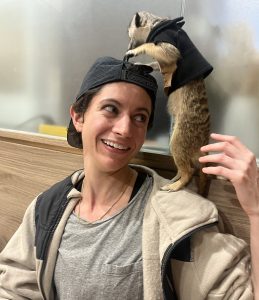 Tony Pasik, MD
Tony Pasik, MD
Chief Resident for Recruitment
Hometown: New York, NY
Undergraduate College: Barnard College
Medical School: Icahn School of Medicine at Mount Sinai
Why did you choose UW Psychiatry?
I chose this program because of its commitment to progressive thinking and its warm resident body. When I interviewed, it seemed that the residents here are tending to a beautiful culture of collaboration, authenticity, and dedication to growth — an assessment that proved to be a spot on. Social and health justice are a priority to me, and its refreshing to be at an institution that aligns with my values and have comradery in this mission.
Academically, I wanted to have robust psychotherapy training. UW is the birthplace of DBT, and additionally has broad psychotherapy training including psychodynamic, CBT, ACT, couples therapy, and more — with excellent supervisors in each area.
I would be remiss not to include that I also chose this program because of a calling from the trees. The nature of cascadia is magically healing, and it makes sense to me to study mental healthcare in this setting. I recently moved to a cabin in the mountains to make sure I take in as much of her grandeur as possible.
And in the midst of this awesome nature, the city of Seattle is one of the most gender-diverse cities in the country. As a genderqueer creature, it’s important to me to live among my community; I love walking around this city seeing people’s gorgeously creative gender expressions.
Career Goals
My clearest career goal is to stay involved in health justice and advocacy. My other career goals are fluid, as with much of myself. And that’s part of why I love this program and field — there’s freedom to explore and great support to pursue a variety of pathways. In whatever area I pursue, I do plan to incorporate psychotherapy. I also want to travel, so I’ll likely check out locums.
Clinical Rotations
- Monday: DBT at the UW Outpatient Clinic
- Tuesday: Recruitment Chief
- Wednesday: LTCC at the VA
- Thursday: Didactics, Recruitment Chief
- Friday: Child BHIP
How many hours on average do you work each week?
40
How often do you work nights and weekends?
Call shifts are mostly training calls with interns. About 3 shifts every 6 months.
Monday
Day: Drive to OPC for DBT training program; call my friend from New York on the commute. Meet with supervisors and attend seminar. Co-lead group therapy and see my individual therapy patient.
Evening: Drive home and enjoy dinner with my partner.
Tuesday
Day: Work from home at our cabin in the mountains. Eat breakfast outside on the porch and catch up on chief duties (emails, tasks, etc). Meet with prospective applicants. Attend open house. Meet with more applicants.
Evening: Pick berries in the yard and eat dinner outside. Watch Bee & Puppycat and eat ice cream.
Wednesday
Day: Drive to the VA. See my long-term continuity medication management patients. Supervision. See my psychodynamic therapy patient.
Evening: Go to my own therapy (I prefer in person). Go to my friend’s place and hang out with them and their kid. Sleep over.
Thursday
Day: Morning, didactics and T-group. Afternoon, work on chief tasks and meet with applicants.
Evening: Pick up my other partner from work. Drive to the river near home and spend an hour there before heading home for dinner; the sun doesn’t set until around 9 during the summer — I must take advantage.
Friday
Day: Drive to Shoreline primary care clinic for Child BHIP. Case review for collaborative care model. See patients.
Evening: Head to a longhouse to connect with the suspension and body modification community.
Saturday
Day: Host a gathering at the river near the house and hang with everyone and their kids and dogs. Enjoy the sunshine, grill, swim.
Evening: Watch a movie with the stragglers from the river gathering.
Sunday
Day: Make a big breakfast, eat outside. Mow the lawn. Catch up on to-dos.
Evening: Quarterly check-in date with my partner
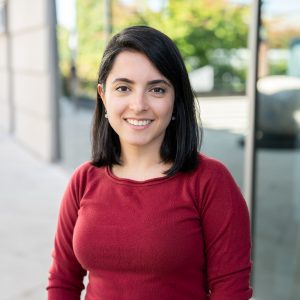 Farzaneh Farhadi, MD
Farzaneh Farhadi, MD
Chief Resident for UW Outpatient
Hometown : Tehran, Iran
Undergraduate College and Medical School: Iran University of Medical Sciences, Tehran, Iran
Why did you choose UW Psychiatry?
I decided to pursue a psychiatry residency because I am passionate about improving the quality of life. Among all my medical school rotations, psychiatry was the one I enjoyed the most. I wanted to train in a program that could nurture this interest and provide a variety of opportunities, allowing me to work with diverse care teams and patient populations. I have a deep love for teaching and wanted to be part of a program that offered teaching opportunities. As an IMG, an inclusive environment was also important to me. The fact that UW is a big family of psychiatry residents was another appealing aspect. I admire how large and diverse each class is while still being warm and welcoming. Additionally, I hoped to learn and practice neuromodulation, psychotherapy, mental health justice, and leadership during my residency, and UW offers all these and more. Last but not least, I found Seattle to be a fantastic city to live in, with nature providing an abundance of blessings within minutes to a couple of hours of driving.
Career Goals
At this point, I am still deciding on my specific career path. I believe my R4 year will be a valuable experience, exposing me to different rotations where I can discover my primary interests. As of now, I find myself intrigued by every psychiatry rotation I’ve undertaken so far, I enjoy being the OPC chief and doing research!
Clinical Rotations
- Monday: Seattle NTC (Brain Stimulations)
- Tuesday: HMC Rehab Team, HMC Neurology MBWC
- Wednesday: UW Outpatient Clinic (OPC)
- Thursday: Didactics, Supervision/Scholarly Time
- Friday: Chief Resident Time
How many hours on average do you work each week?
40 hours
How often do you work nights and weekends?
Night and weekend shifts are mostly training call shifts with interns. About 3 shifts every 6 months.
Monday
I’m on my Seattle NTC rotation, where I focus on neuromodulation. It’s been a fascinating and highly educational experience, offering exposure to cutting-edge treatments in psychiatry.
Tuesday
- Morning: I’m in the Psych Rehab clinic, working with a multidisciplinary team—including nurses, social workers, therapists, and a case manager—to support patients with more acute psychiatric needs in an outpatient setting.
- Afternoon: I rotate through the Memory and Brain Wellness Clinic, where I explore the intersection of psychiatry and neurology, deepening my understanding of brain health and cognitive disorders.
Wednesday
I spend the full day at my Outpatient Psychiatry Clinic (OPC) continuity clinic, providing longitudinal care for my patients.
Thursday
My day begins with didactics, T-group, and our pathway meeting from morning until 1 PM. The remainder of the day is dedicated to my research project.
Friday
I have dedicated chief time in my role as Chief Resident at the Outpatient Psychiatry Clinic and supervision for my psychotherapy cases.